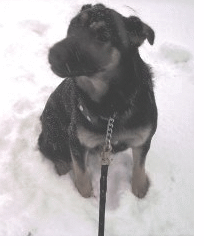For everyone that does not need another piece of email in their Inbox...
 2010-02-24
Since we've had and are about to get hit with another major snowstorm here in Pennsylvania, in this issue, we searched the web for some cold weather tips.
PETS AND THE COLD WEATHER
Source: About.com Veterinary Medicine
Foot care
Dogs walking in snowy areas may get large ice balls between their pads, causing the dog to limp. Be sure to keep ice clear from this area. For dogs that have a lot of hair between the pads, keeping it clipped shorter will help with ice ball formation. Dog boots offer protection to those dogs that will tolerate wearing them.
|
|
Salt and chemical de-icers
Pets who walk on sidewalks that have been "de-iced" are prone to dry, chapped, and potentially painful paws. This will encourage the pet to lick their paws, and ingestion may cause gastrointestinal irritation and upset. Wash off your pet's feet after an outing with a warm wet cloth or footbath.
 Frozen lakes and ponds
Frozen lakes and ponds
Animals don't realize what "thin ice" is. Once they fall in, it is very difficult for them to climb out and hypothermia is a very real and life-threatening danger. "Ice skating" dogs are prone to injuries such as cruciate tears if allowed to "skate" with their humans. This is also true of icy walks.
Antifreeze Dangers
Thirsty and curious pets will lap up antifreeze. Just a few licks can be fatal. Lock up antifreeze containers and clean up spills immediately. For more information, please see previous article about antifreeze toxicity.
Heat-seekers beware!
Cats will seek warmth where they can get it, and that may be the warm engine of a car just parked. Before starting your car, knock on the hood or honk the horn to scare off any cats - and prevent tragedy.
Arthritic animals
Arthritis is worse during cold and damp weather. Take special care to handle your pet gently, watch out for icy walks, provide soft (and possibly heated) bedding, and administer any necessary medications. See your veterinarian if your pet is arthritic or you suspect arthritis.
Other Important Cold Weather Tips
Never let your dog off the leash on snow or ice, especially during a snowstorm—dogs can lose their scent and easily become lost. More dogs are lost during the winter than during any other season, so make sure yours always wears ID tags.
Make sure your companion animal has a warm place to sleep, off the floor and away from all drafts. A cozy dog or cat bed with a warm blanket or pillow is perfect.
|
That's it for this issue of our Newsletter.
Be sure to check back here again for our latest Newsletter. |
|
| 






 Frozen lakes and ponds
Frozen lakes and ponds
